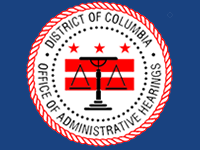This page explains the rules that govern the OAH hearing process and the laws that more generally govern how OAH operates as an agency. If you are looking for laws and regulations that may apply to the disputed issues in your specific type of case, visit the Help page.
OAH Rules of Practice and Procedure
The OAH Rules explain the steps required to complete the OAH hearing process, from requesting a hearing to appealing a judge’s final decision. The OAH Rules are officially published in Title 1, Chapters 28 and 29 of the D.C. Municipal Regulations (DCMR).
A downloadable version of the rules in pdf format, which includes a crosswalk to the prior version of OAH rules, is also available here.
Chapter 28 covers procedures generally for OAH cases.
Chapter 29 has special rules and procedures for specific case types. When looking for rules that apply to your case, first check to see if any specific Chapter 29 Rules apply. If not, look at the general rules in Chapter 28.
- For DCPS and OSSE, see OAH Rules 2900-09
- For DFHV, see OAH Rules 2910-13
- For Rental Housing, see OAH Rules 2920-42
- For Public Sector Worker’s Compensation, see OAH Rules 2950-56
- For Public Benefits, see OAH Rules 2970-79
- For Unemployment Insurance, see OAH Rules 2980-86
- For Definitions, see OAH Rule 2999
Laws that govern how OAH operates
There are two main sources of laws that govern how OAH operates and the types of cases OAH may hear.
The first is the OAH Establishment Act. The D.C. Council passed this Act to create OAH and to establish OAH’s authority to hear certain types of cases. Among other things, the Establishment Act gives OAH “jurisdiction” over specific types of cases. Jurisdiction refers to a court’s authority to hear and decide cases. The Establishment Act also explains the authority and duties of OAH’s Administrative Law Judges. You can find the OAH Establishment Act in Title 2, Chapter 18A of the D.C. Code.
The second is the D.C. Administrative Procedure Act, which generally governs how all D.C. agencies must operate. As a D.C. agency, OAH creates rules and publications that generally apply to everyone going through the OAH hearing process, so OAH must comply with the Administrative Procedure Act when creating general rules and publications. OAH also hears contested cases between individual parties, so OAH must also follow the Administrative Procedure Act in these instances as well. You can find the Administrative Procedure Act in Title 2, Chapter 5, Subchapter I of the D.C. Code.
While the OAH Establishment Act and the D.C. Administrative Procedure Act are two main sources of laws that govern OAH operations, other laws may apply in some types of cases. For example, in cases at OAH involving civil fines, OAH may be subject to the Civil Infractions Act or the Litter Control Administration Act, depending on the type of case.
Laws and Rules that apply to the selection and tenure of Administrative Law Judges
OAH has over thirty Administrative Law Judges who hear and decide individual cases. OAH judges must meet specific qualifications and complete an appointment process.
The OAH Establishment Act explains the necessary qualifications for Administrative Law Judges. The Establishment Act also created the Commission on Selection and Tenure (COST) to conduct the appointment process. COST has authority to appoint, reappoint, discipline, and remove OAH Administrative Law Judges. Along with the OAH Establishment Act, COST regulations describe the qualifications for an Administrative Law Judge and the appointment process. You can find COST regulations in Title 6, Subtitle B, Chapter 37 of the D.C. Municipal Regulations. Notice of upcoming COST meetings is posted under the "Latest News" section of the OAH Home page, and you can view the minutes from past meetings on the COST Meetings page.
Besides meeting the qualifications in the OAH Establishment Act and the COST regulations, OAH Administrative Law Judges must also abide by the Code of Ethics for OAH Administrative Law Judges.
You can read about OAH’s current Administrative Law Judges on the Biographies page.
